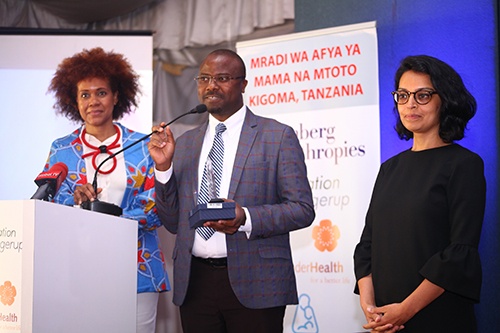 June 20, 2019 was a day for celebration and a milestone in the sustainability of a life-saving maternal health program in Tanzania. A maternal and reproductive health program in the remote region of Kigoma, funded for over a dozen years by international donors (Bloomberg Philanthropies and Fondation H&B Agerup), was officially handed over to its rightful owner, the Government of Tanzania.
June 20, 2019 was a day for celebration and a milestone in the sustainability of a life-saving maternal health program in Tanzania. A maternal and reproductive health program in the remote region of Kigoma, funded for over a dozen years by international donors (Bloomberg Philanthropies and Fondation H&B Agerup), was officially handed over to its rightful owner, the Government of Tanzania.
With hands-on support and technical assistance from the advocacy experts at the Global Health Advocacy Incubator, project partners achieved an enormous success in securing government support and funding to keep this vital program operational after the departure of international donors. Locally-owned, locally-led interventions are a hallmark of good development work, and GHAI specializes in sustainability across programmatic and regional interventions.
The Kigoma maternal and reproductive health program had been an unqualified success, tackling a vital need in a country where a woman dies almost every hour from complications of pregnancy and childbirth. To address this challenge, Government of Tanzania, local advocates, and international donors have been working together in Kigoma since 2006 to upgrade health facilities and train staff to bring life-saving care to women where they live, including remote and rural areas. Over the course of this innovative program, more than 210,000 newborns were delivered in project-supported facilities and almost 2,200 maternal deaths were prevented. Kigoma region went from having the worst health indicators in the country to among the best.
As the project’s sustainability partner, the Global Health Advocacy Incubator helped doctors and nurses become effective advocates who could identify and persuade key policymakers to support long-term funding for this life-saving program.
GHAI provided hands-on, continuous technical assistance as implementing partners Engender Health and Thamini Uhai developed a strategic plan, put it into practice and tracked successes along the way. The Incubator and our partners mapped decision-makers in the budget process to identify advocacy targets, supported tactics and strategies such as informational events, fact sheets and high-level meetings to build a base of support in Parliament, and engaged local governments to build their capacity to incorporate comprehensive maternal health services into their requested health budgets.


As a result, thirteen years after this life-saving project began, the Kigoma maternal and reproductive health program was formally handed over to the government on June 20. It was a day of celebration – bringing together government officials, doctors, community health workers, project partners, and the international donors. Partners presented on their work and announced the stunning statistics: in 2011, only 48.4% of women in Kigoma delivered in facilities, now 84.9% of them do. Dignitaries from the President’s Office of Regional Administration and Local Government and Ministry of Health also spoke, thanking the donors and partners for their hard work and dedicated partnership with the government. The Regional Commissioner of Kigoma closed the program, promising to sustain the high-quality services provided through the program.By focusing squarely on sustainability and applying technical expertise and advocacy know-how to a successful project already in progress, the Global Health Advocacy Incubator was able to support the transition of a life-saving program from temporary donor funding to sustainable, locally-owned government funding.
